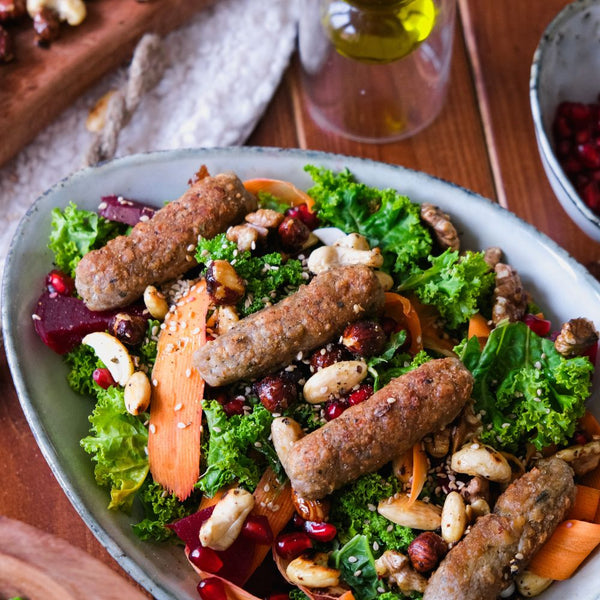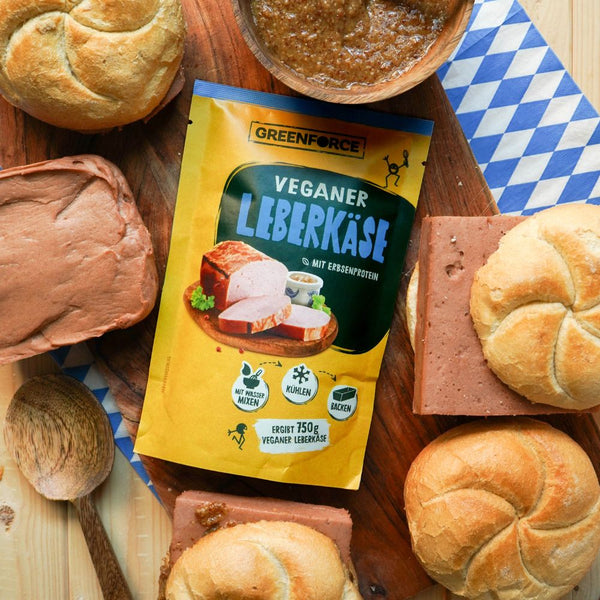Our goal with our products is to secure the protein supply of future generations based on plant proteins. It is therefore particularly important to us to offer high-quality, protein- and fiber-rich products.
All of our Easy To Mixes are made from protein-rich ingredients, such as pea protein, broad beans or sunflower seeds. But what are proteins anyway? And what are proteins used for in our bodies? You can find out this and much more in this blog post.
What are proteins and what are they made of?
In addition to fats and carbohydrates, proteins are among the macronutrients that we consume through our food and that are vital main sources of energy for our body.
You can imagine the structure of a protein as a long chain of small building blocks that has a very specific shape. The smallest building blocks of a protein, called amino acids, are linked together by chemical bonds.
There are a total of 21 different amino acids , 9 of which are essential for adults. Histidine is also an essential protein for infants. These essential amino acids cannot be produced by the human body itself, but must be supplied through the diet.
A person has hundreds of thousands of different proteins, which differ in the way amino acids are linked together and how they are folded. Each protein fulfills its own function depending on its shape.


What do proteins do for our body?
As already mentioned, there are many different proteins in our body that fulfill different functions depending on their amino acid composition and folding.
Proteins are divided into the following groups:
- Structural proteins are responsible for giving our cells their shape.
- Transport proteins are responsible for transporting oxygen and fat.
- Storage proteins help the body store certain substances.
- Contractile proteins ensure the movement function of our muscles.
- Protective proteins are part of our immune system as antibodies.
- In addition, many hormones and enzymes are proteins.
However, the lifespan of a protein is limited, which is why body proteins are constantly exchanged throughout our lives as part of what is known as protein biosynthesis. It is therefore urgently necessary that you continuously supply your body with all amino acids through the supply of dietary proteins.
How much protein should you consume?
The German Society for Nutrition recommends that adults aged 19 to under 65 eat 0.8g protein/kg body weight per day. Athletes can increase this value to up to 1.8g protein/kg body weight per day for optimal muscle building.
In addition, an increased protein intake means that you are full for longer. That's why the German Society for Nutrition also reports that a short-term, very protein-rich diet of 3 to 6 months can help with weight loss. However, this effect slowly wears off after the period mentioned.
In addition to the daily amount of protein, attention should also be paid to the amino acid profile of the protein sources. Because 12 of the 20 amino acids are essential, it is urgently necessary to consume these 12 amino acids through your diet.
Which vegan foods are particularly high in protein?
Many people fear a protein deficiency as soon as they switch to a vegan diet. This concern is completely unfounded because there are plenty of plant-based protein sources.
These also include our Easy To Mixes. For example, our Easy To Mix Hack has 15g of protein per 100g.
Other plant-based, protein-rich foods include all legumes (e.g. peas, beans, lentils, etc.), soy products such as tofu or tempeh and all types of nuts, kernels and seeds. But cereals and pseudo-cereals such as oats, quinoa, amaranth and wheat are also excellent sources of protein.
As you can see, it's no problem at all to eat a vegan and protein-rich diet, especially if you incorporate our Easy To Mixes into your menu. However, if you are still not sure how the vegan diet is supposed to work, we have designed a booklet for you that will make it easier for you to get started with your vegan diet. You can find the booklet here .


















